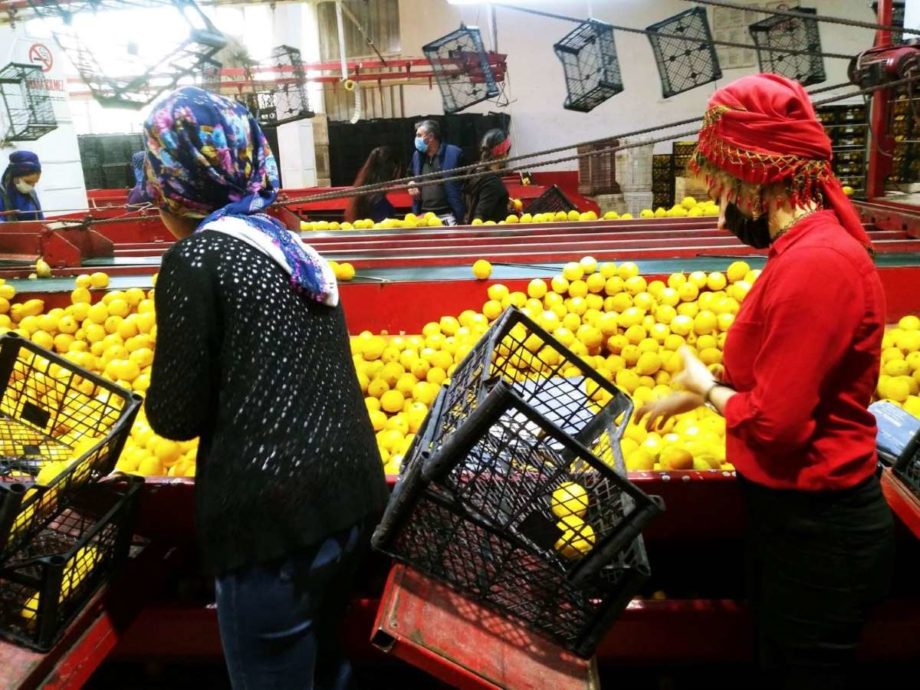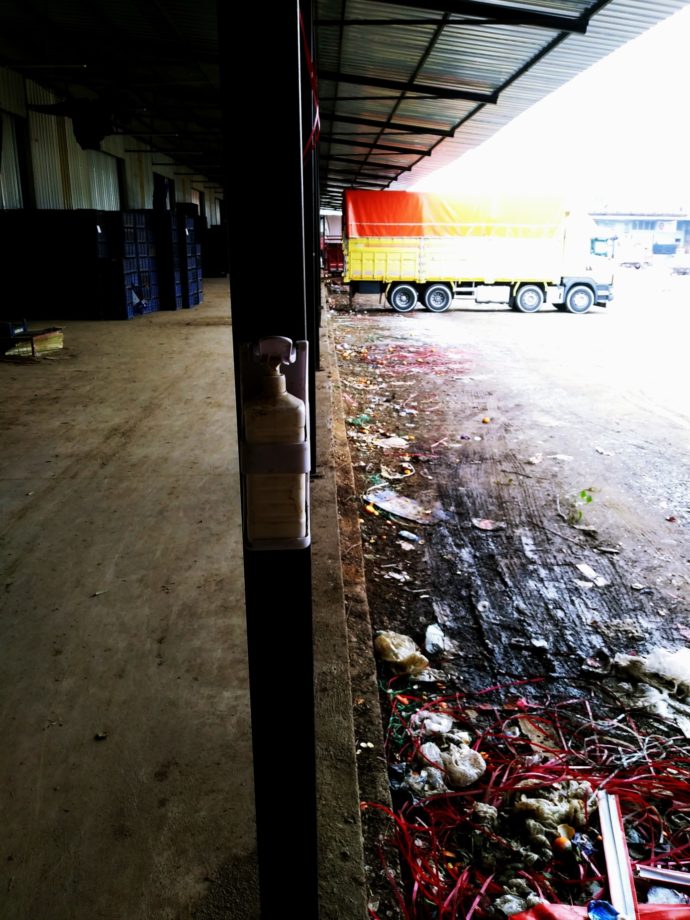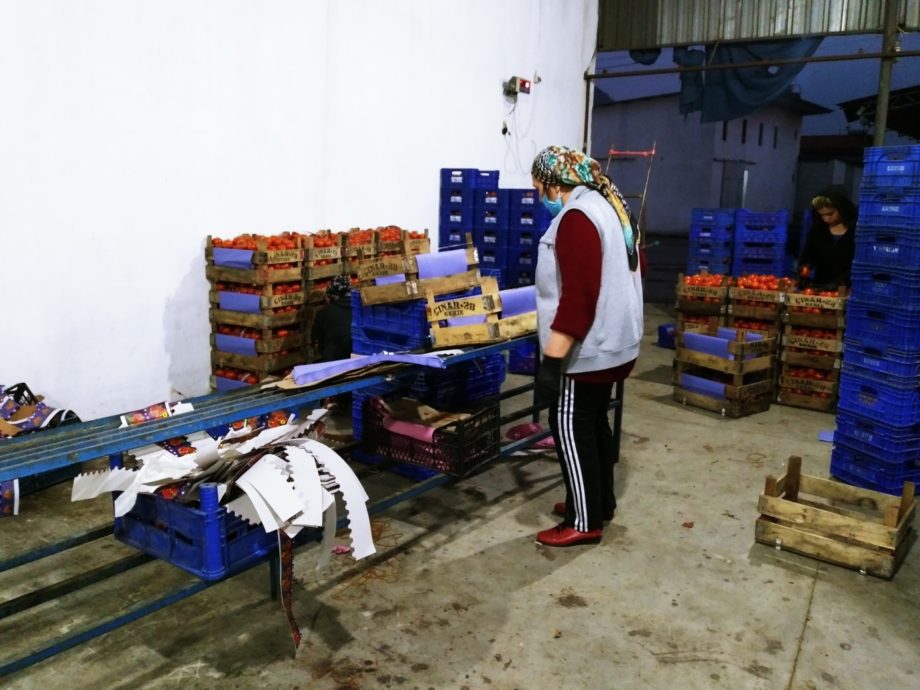Agricultural Workers in Turkey during the Pandemic
Some Ethnographic Observations
This post aims to deliver the experiences of people who are working temporarily on farms and/or in fresh produce packaging operations. The ideas presented here are informed by my ongoing ethnographic fieldwork which I am still executing at the time of writing up this text. The people whose experiences I am writing about are mainly Syrian refugees who had forcibly migrated to Turkey following the Syrian War, but also Kurdish people who traveled from their home cities in the southeastern region of Turkey to western Turkey for seasonal agricultural work, and also Turkish villagers. All of them have been working under exploitative work conditions – without social security protection, worker rights, and fair payment – before the pandemic and also during the pandemic.

Women working in a citrus fruit packaging factory. February 2021. Source: Elçin Turan.
The temporal value of agricultural workers and their work
We are all waiting in line next to the citrus fruit packaging machine that will soon be started up by the patron.[1] Previously, we were waiting in the same line to be checked by the patron’s foreman with the digital forehead thermometer. After that, each of us was given one mask. Now that the patron is sure none of us has a high temperature, it is time to start work: we will be cleaning and packaging tons and tons of oranges that will then be transported to the market. While we are working, we often hear the loud, angry voices of the patrons (both male and female – they are a husband and wife team) shouting: „Put the mask over your mouth!“ (Field observation, 17.01.2021)
This kind of brutal warning is not uncommon in the fresh produce packaging factories where the work is mostly done by Syrian refugees and Kurdish mobile agricultural workers. Inside the factory exemplified in the paragraph above, there is a signboard consisting of the following words: „Workers‘ health is first. Please put on your mask.“ The surgical face masks are regularly provided for the agricultural workers working in those packaging factories and hand sanitizers are placed in and around the factories. The actual motivations of the employers behind this sudden attention on their workers’ health, are workplace audits in wake of COVID-19 and also interest in their own health because they are present in the same workplace with the workers to control the latter and the work.
According to Bergfeld and Farris (2020), the traditional division of labor between intellectual and manual work that legitimizes wage inequality and devalues manual labor by placing it in a lower category than all other forms of employment, appears to be breaking down during the pandemic. All agricultural workers i.e. the ones in Turkey, Mexican agricultural workers in the US (see, e.g., Evich, Bustillo & Crampton 2020), seasonal agricultural workers in Europe, most of whom are cross-border migrants (see, e.g., Borges & Huet 2020), were at least officially recognized as ‘essential workers’ at the beginning of the pandemic, while, paradoxically, they all are obliged to continue working under poor conditions. In Turkey, the last time when agricultural workers had a place in the agenda of the state authorities dates back to 2014. The Turkish Grand National Assembly had decided on the establishment of a committee on 11th November 2014, which came up with radical proposals to solve the problems of agricultural workers, such as signing ILO-18464 and including all agricultural workers in the Labor Law (Mura 2016). But those solutions were never implemented and agricultural workers were deemed invisible in the following years until the outburst of the COVID-19 pandemic. With the pandemic, they have been given attention as important actors sustaining agricultural production and providing food security which would be in danger otherwise. However, this attention has not gone beyond providing few surgical face masks, placing hand sanitizers in the workplaces, and warning the workers to obey sanitation guidelines. In other words, the temporal attention has worked to reproduce the agricultural workforce (in the Marxian sense) without being turned into any kind of legal protection and right provision.

A hand sanitizer used as a ‘COVID-19 protection measure’ at one of the packaging factories. This is the area where trucks are loaded with fruit by the male workers after it has been processed by their female counterparts inside the factory, where there is another of these sanitizers. The area in the photograph is also used as a dump for waste products and general garbage. January 2021. Source: Elçin Turan.
Being obliged to work insecurely under the pandemic
In the face of the COVID-19 pandemic, Turkey has never imposed a complete lockdown although this was strongly recommended by scientists. Besides, the COVID-19 measures up to now and the current vaccination process have not been conducted transparently, sufficiently, and equally. There are problems with vaccine supply in Turkey, the number of people who have been vaccinated so far is much lower than planned, and some senior state officials are included in the priority list for no real reason while many professional groups are in urgent need of vaccination[2]. One of those groups consists of wage workers most of whom work with limited security or without any security at all – the latter is true for farm workers and fresh produce packaging workers in my fieldsite. Under those terrifying pandemic conditions, precarious wage workers and agricultural laborers have been left with the dilemma of being infected with the virus at their workplaces.

Villagers doing the work of tomato packaging. February 2021. Source: Elçin Turan.
At the beginning of the pandemic, it was surprising to witness that my agricultural worker interlocutors were not perceiving the coronavirus pandemic as a problem while people around the world were in a panic. For agricultural workers who are deprived of any worker rights while, at the same time, being exposed to poor living conditions, „staying at home“ would be a problem. A young Syrian female interlocutor working at the wholesale fruit and vegetable market in my fieldsite, explains: “When they first told us about the pandemic here, they started imposing prohibitions, as you know. They told us it was forbidden to work in the wholesale market, and they imposed a curfew, at first on Saturdays and Sundays… So that was a real headache for us. After that, however, they started allowing us to work, and since then there hasn’t been a problem.”
Being obliged to work under pandemic conditions has been more common among my Syrian interlocutors compared to Turkish villagers. During the pandemic, Syrian labor has been even more in demand with employers needing to make up for the lack of Turkish labor. My interlocutors from the villages said that in March 2020, when news of the first coronavirus cases was made public in Turkey, they had been unwilling to harvest summer oranges. As a result, the employer sent his Syrian workers to do the harvesting work instead: This latter group, who were more in need of money than their Turkish counterparts, readily agreed to do the job.
Besides the problem of having to work at a young age, 16-year-old Fatma from Syria is also faced with the problem of the virus threat in the packaging factory where she works. She explains how she and her younger sister working in the same factory are worried about that: „My mother always warns us to wash our hands frequently and not to take our masks off. When I pray, I always pray I will not be infected with the virus, inshallah.“
Being a nondocumented migrant amidst the pandemic
The condition of official registration for getting the COVID-19 vaccine may act as a deterrent to undocumented migrants who are already feeling the threat of being deported. Turkey’s unbalanced migration policy has recently not favored the presence of Syrians in Turkey. Since 2018, Turkey has stopped registering Syrian migrants and since then Syrians including my nondocumented interlocutors have been worried about being deported. One male undocumented Syrian worker, soon after asking me to accompany him to the migration office for issuing an identity document for himself and his family, gave up this plan because of his worry of being deported if he approaches a state institution. This situation leaves them devoid of any rights, and may also result in them not being able to benefit from the vaccinations.
Also, undocumented migrants are at risk of losing their jobs in the face of tightening controls during the pandemic at workplaces: In one of the citrus fruit packaging factories where I conduct participant observation, one undocumented Syrian male worker had an accident at work. He tried to treat himself by taking pills, being unwilling to go to a hospital because of his undocumented status. When he went back to work, he was found to have a high temperature during the regular check that took place every morning before the day’s work began. Consequently, he was asked by his employer to bring a document from the hospital proving that he had not been infected with the virus. The man’s nephew Hasan, one of my interlocutors who works in the same factory as his uncle, said: “I took him to the hospital. The doctor checked him and found that he did not have the virus, but they did not provide us with a document of any kind.” In the end, Hasan’s uncle was fired leaving the whole family in even more devastating economic and living conditions.
Written on 23 February 2021
About the author
Elçin Turan continues her doctoral studies in Social and Cultural Anthropology at the University of Cologne. Her doctoral research focuses on labor relations and everyday experiences of Syrians engaged in agricultural work. The research lies at the intersection of class, citizenship, gender, ethnicity, and age. Contact: eturan3@smail.uni-koeln.de
#Witnessing Corona
Witnessing Corona is a joint blog series by the Blog Medical Anthropology, Curare: Journal of Medical Anthropology, the Global South Studies Center Cologne, and boasblogs.
References
Bergfeld, M. & Farris, S. (2020, May 10). The COVID-19 Crisis and the End of the “Low-Skilled” Worker. Spectre Journal. https://spectrejournal.com/the-covid-19-crisis-and-the-end-of-the-low-skilled-worker/
Borges A. And Huet N. (2020, July 22). Invisible workers: Underpaid, exploited, and put at risk on Europe’s farms. Euronews. https://www.euronews.com/2020/07/17/invisible-workers-underpaid-exploited-and-put-at-risk-on-europe-s-farms
Evich H. B., Bustillo X. and Crampton L. (2020, August 9). Harvest of shame: Farmworkers face coronavirus disaster. Politico. https://www.politico.com/news/2020/09/08/farmworkers-coronavirus-disaster-409339
Mura, E. S. (2016). Dynamics of Intermediation in the Agricultural Labor Market: Women Workers in Adapazarı, Turkey. (Doctoral dissertation, Middle East Technical University, Ankara, Turkey). Retrieved from: https://etd.lib.metu.edu.tr/upload/12619955/index.pdf
Footnotes
[1] The word patron in Turkish means ‚boss‘. This is the word that is commonly used by workers when referring to their employer i.e. the owner of the packaging factory or the landowner.
[2] Retrieved from the Turkish Medical Association (TTB) which is an independent medical organization in Turkey: https://www.ttb.org.tr/

































